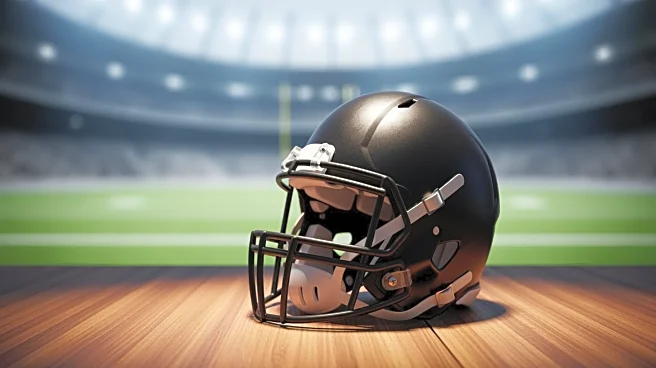What's Happening?
Buffalo Bills rookie defensive end Landon Jackson sustained a knee injury during his third career game against the Miami Dolphins. The injury occurred on Jackson's second snap when he came off the left edge during a run play, fought off a block, and fell
backward, immediately clutching his right knee in pain. Jackson, who was the No. 72 overall pick in the third round of the draft, had been a healthy scratch for the first six games of the season. His injury leaves the Bills with only three healthy defensive ends: Greg Rousseau, Javon Solomon, and Joey Bosa. The team is already dealing with the absence of defensive ends Michael Hoecht, who suffered a season-ending Achilles injury, and A.J. Epenesa, who is currently in the concussion protocol.
Why It's Important?
Jackson's injury is a significant setback for the Buffalo Bills' defensive line, which is already strained due to injuries to key players. With Jackson out, the team faces challenges in maintaining a robust defense against opponents. The loss of multiple defensive ends could impact the Bills' ability to pressure opposing quarterbacks and defend against the run, potentially affecting their overall performance in upcoming games. This situation underscores the importance of depth in the roster and the need for strategic adjustments by the coaching staff to compensate for the depleted defensive line.
What's Next?
The Buffalo Bills will need to reassess their defensive strategy and possibly explore options for reinforcing their defensive line. This could involve promoting players from the practice squad or seeking external talent to fill the gaps left by injured players. The coaching staff will likely focus on optimizing the performance of the remaining healthy defensive ends and adjusting game plans to mitigate the impact of these injuries. The team's ability to adapt to these challenges will be crucial in maintaining their competitive edge in the league.
Beyond the Headlines
The injuries to key defensive players highlight the physical demands and risks associated with professional football. Teams must balance the need for aggressive play with the health and safety of their athletes. This situation may prompt discussions about player welfare, injury prevention, and the long-term implications of frequent injuries in the sport. Additionally, it could influence the Bills' approach to player development and recruitment, emphasizing the importance of building a resilient and adaptable team.















